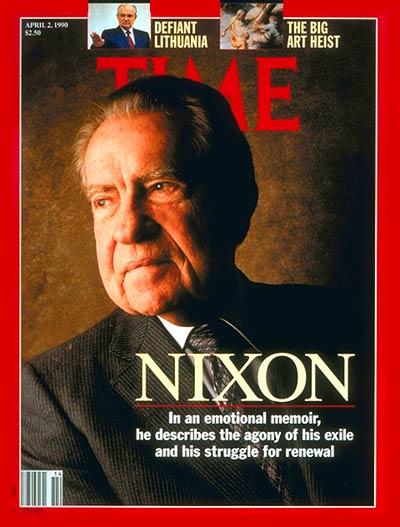
Flip through the gallery of Richard Nixon’s appearances on the cover of TIME, and you may notice a gap: the covers chart his political rise, his presidency, his work in China, his reelection, his fight during Watergate and, finally, 40 years ago this week, his resignation. Then there’s his pardon and, a few years later, his famous interview with David Frost, which was later inspiration for the play and film Frost/Nixon.
Then there’s a gap. More than a decade goes by without any Nixon. The two times he appears after the ’70s are on the occasion of his death in 1994 and, in 1990, when TIME published an excerpt from his memoirs. In conjunction with that excerpt, the magazine also took the chance to ask him a few questions. In an interview that covers such diverse topics as the winding down of the Cold War and Nixon’s thoughts on Reagan (“we had different approaches”) and George H.W. Bush (“I ought to leave it in football terms—he’s the Joe Montana. The short, sure pass”), the only U.S. President ever to step down discussed his feelings about making that choice.
There’s life after disgrace, he reminded readers:
Q. How do you expect the Watergate affair to be judged in the future?
A. Clare Boothe Luce once said that each person in history can be summed up in one sentence. This was after I had gone to China. She said, “You will be summed up, ‘He went to China.'” Historians are more likely to lead with “He resigned the office.” The jury has already come in, and there’s nothing that’s going to change it. There’s no appeal. Historians will judge it harshly. That’s what I would say on that.
Q. Why did you write this book?
A. I really wrote this book for those who have suffered losses or defeats and so forth, and who think that life is over. I felt that if I could share with them my own experiences, it might help.
The problem with that, of course, is that resigning the presidency is something that is beyond their imagination. And so, consequently, that’s why throughout the book I tried to put it in a context that they could understand. But I felt that if I could let them see what I went through, and how I at least recovered in part, that that might tell them that life wasn’t over.
Q. You say in your new book that you recovered in part. You also say that you have paid, and in fact are still paying, the price for it.
A. By paying the price, I mean in terms of being able to influence the course of events. I mean, every time I make a speech, or every time I write a book, inevitably the reviewers refer to the “disgraced former President.”
And I consider, for whatever time I have left, that what is most important is to be able to affect the course of events. My experience has been somewhat unique. I am probably wrong on a number of things, but at least it’s a point of view.
The difficulty is that getting that point of view across is compromised by the fact that they say, Oh, this is the Watergate man, so we’re not going to pay any attention to what he does. Now that attitude has receded substantially, and over a period of time it may recede more, but that’s what I meant by that.
Read the full interview in TIME’s archives
More Must-Reads from TIME
- Cybersecurity Experts Are Sounding the Alarm on DOGE
- Meet the 2025 Women of the Year
- The Harsh Truth About Disability Inclusion
- Why Do More Young Adults Have Cancer?
- Colman Domingo Leads With Radical Love
- How to Get Better at Doing Things Alone
- Michelle Zauner Stares Down the Darkness
Write to Lily Rothman at lily.rothman@time.com